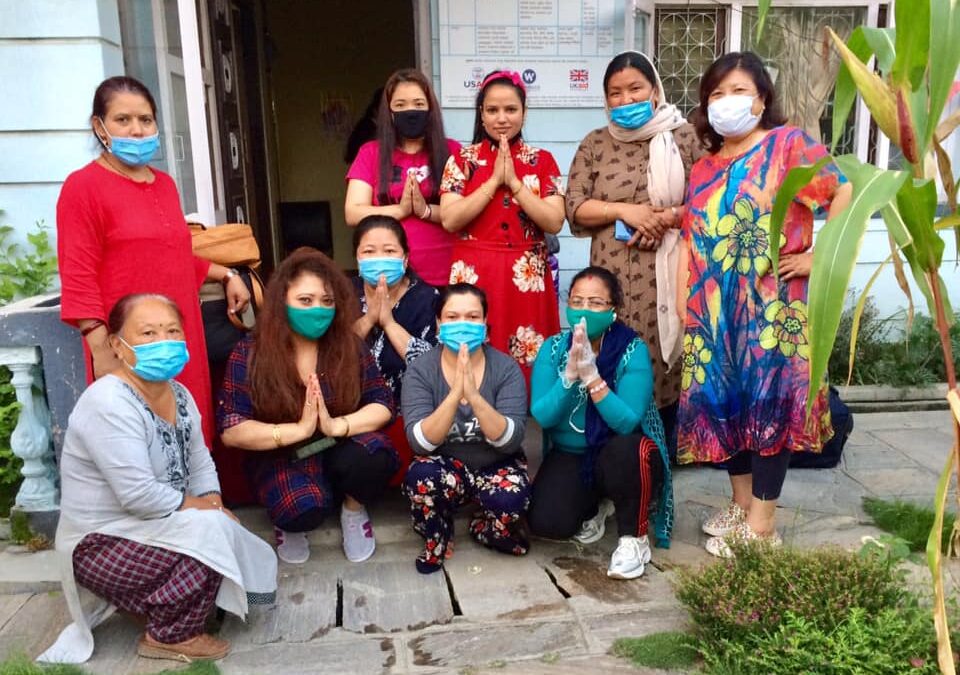
Dec 3, 2020
Globally, marginalized workers have been especially hard hit by the novel coronavirus. Migrant workers in particular have experienced some of the harshest effects of COVID-19 and the related lockdowns, quarantines and travel restrictions.
Yet while the world has recognized “the bravery of frontline workers,” many of whom are migrants, “we must now turn that celebration into something that is meaningful and not just ephemeral,” says United Nations Secretary-General António Guterres.
We must ensure “fair and ethical recruitment, decent work, and access to health care and social protection without discrimination. It is also critical we promote financial inclusion of migrants and their families. We must address discrimination … migrants must not be stigmatized or denied access to medical treatment and other public services.”
Guterres spoke during release of the first UN Secretary General’s report on the Global Compact for Safe, Orderly and Regular Migration. Adopted in December 2018, the Global Compact sets out a cooperative framework for achieving safe, orderly and regular migration within a rights-based framework, and includes a process for implementation and review.
The report, part of the UN review process, focuses extensively on the effects of COVID-19 on the world’s 272 million migrants and the guidance the Global Compact offers in addressing the adverse effects on migrant workers.
Fewer Protections for Migrant Workers Under COVID-19
As borders and worksites were shut early this year, millions of migrant workers were stranded around the world, many trapped in crowded housing with no access to support, including access to food and other life-sustaining provisions. Many migrant workers were systematically denied social safety net protections like unemployment benefits or other forms of income support.
Others were forced to work in unsafe conditions, suffered from wage theft, and retaliation for speaking out about abuse. Origin countries frequently lack adequate health infrastructure, exposing those who returned to a greater risk of contracting COVID-19, or making it difficult for those who were infected to find care. Migrants returning in these conditions are also particularly vulnerable to exploitation, violence, stigma, discrimination and, without jobs, may be unable to support themselves or their families.
Although some governments took positive steps to voluntarily return migrant workers, according to the Global Compact report, many imposed even harsher restrictions. “The pandemic has been used by some [countries] to justify the increased and discriminatory use of immigration detention and to deport migrants without due process,” the report said.
The COVID-19 crisis also has worsened the situation for migrants in countries where they work. In Central Asia, the COVID-19 pandemic “exposed structural and institutional flaws in the way migration is managed in the region,” making conditions for migrant workers dire, according to a shadow report on implementation of the Global Compact in the Central Asian region. The shadow report cites such structural flaws as lack of work contracts that result in wage theft, no regulation of work hours and little or no access to health care or other social and legal protections. It was submitted to the UN by the Solidarity Center, the International Labor Initiatives (ILI), Insan Leilek and the Kazakhstan International Bureau for Human Rights.
The pandemic is especially hard on women, including the 8.5 million migrant women in domestic work, as well as lesbian, gay, bisexual, transgender and intersex migrants, the Global Compact report finds. Even as domestic violence is increasing during the pandemic, resources are being redirected away from sexual and reproductive health services. The Global Compact report points to the need for a gender-responsive, rights-based approach to migration all the more necessary.
Remove Barriers that Repress Migrant Workers’ Full Potential
Rooted in the UN Declaration of Human Rights and internationally agreed standards and frameworks, the Global Compact is grounded in rights-based policies and is a “call to build comprehensive, rights-based policies to ensure that migrants and their communities can thrive,” according to the report.
As such, “legislation should provide for ensuring the rights of migrants in accordance with international human rights standards, including fair and safe working conditions, the right to good rest, the right to access jobs without discriminatory procedures for obtaining the right to work,” according to a shadow report from Russian unions to the UN. “We believe that receiving countries should provide regulatory and visa flexibility for workers, especially during a pandemic.”
Noting the urgency for greater cooperation across borders during the COVID-19 crisis, including the integration of public health concerns into rights-based border governance, the Global Compact report recommends that member countries implement measures and practices in response to COVID-19 that ensure an inclusive public health response to suppress the virus and restart economies, protect migrants’ human rights and ensure the availability of lifesaving humanitarian assistance.
The report’s recommendations support the UN’s June 2020 Policy Brief: COVID-19 and People on the Move, which states that “the best way to recognize the important contribution made by people on the move to our societies during this crisis is to remove barriers that inhibit their full potential.
“This means facilitating the recognition and accreditation of their qualifications, exploring various models of regularization pathways for migrants in irregular situations and reducing transaction costs for remittances.”
Ultimately, as the report states: “The COVID-19 crisis presents an opportunity to reimagine human mobility for the benefit of all while advancing the central commitment of the 2030 Agenda to leave no one behind.” The report is in line with calls from the global labor movement, led by the International Trade Union Confederation, for a new social contract “between workers, government and business, which should include a floor of a universal labor guarantee for all workers.
“Implementing a New Social Contract would make sure that that rights are respected, jobs are decent with minimum living wages and collective bargaining, social protection is universal, due diligence and accountability are driving business operations, and that social dialogue ensures just transition measures for climate and technology.”
In short: A new social contract must include all workers, including migrants.
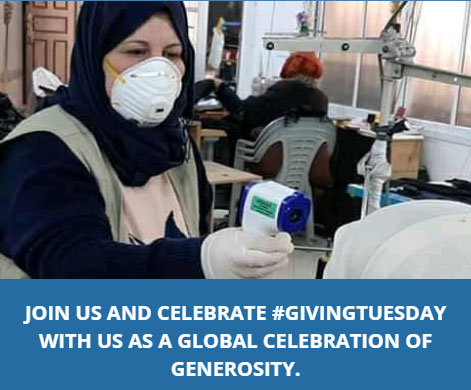
Dec 1, 2020
When the pandemic hit, the Solidarity Center quickly pivoted its programming, drawing on its extensive network in more than 60 countries to rapidly respond to the unprecedented COVID-19 crisis.
- In Kenya, Solidarity Center joined with the Central Organization of Trade Unions (COTU-K) to protect market vendors and reduce community spread of COVID-19 by providing infection control supplies for distribution through worker organizations representing nearly 6,000 informal workers.
- With the Kuwait Trade Union Federation (KTUF), the Solidarity Center connected with migrant worker associations to distribute 100,000 COVID-19 information brochures to 3 million migrant workers in Bengali, French, Hindi, Sinhala Tagalog and addressed unpaid wages and unsafe living arrangements by working with the government officials to solve urgent issues.
- Partners in the Solidarity Center Workers Empowerment and Participation program in Bangladesh distributed 30,000 COVID-19 awareness leaflets to community members and helped reduce rent for garment workers laid off due to COVID-19.
“Whether we were creating innovative organizing ideas or rapidly mobilizing resources for local campaigns and for the sheer survival of unions during this crucial period, we stood strong by our commitment to protect workers and their rights worldwide and strengthen solidarity with our union partners during this time of crushing layoffs and economic devastation,” says Solidarity Center Executive Director Shawna Bader-Blau.
Today, #GivingTuesday, the Solidarity Center is raising $25,000 to support grassroots programs worldwide.
Will you join us to go above and beyond in order to meet this goal? Any gift you make, regardless of the amount, will make a difference through our work.
#GivingTuesday is a day to stand up for what you believe in. It is a day to stand in solidarity with workers and the Solidarity Center’s more than 500 unions and worker rights partners around the world. It’s a day to demonstrate that you care.
“Resilience is part of who we are and always have been,” says Bader-Blau. “Our union partners and workers worldwide have faced unimaginable hardships but have demonstrated perseverance and innovation in many new ways. And we are standing right there with them.”
Donate now!
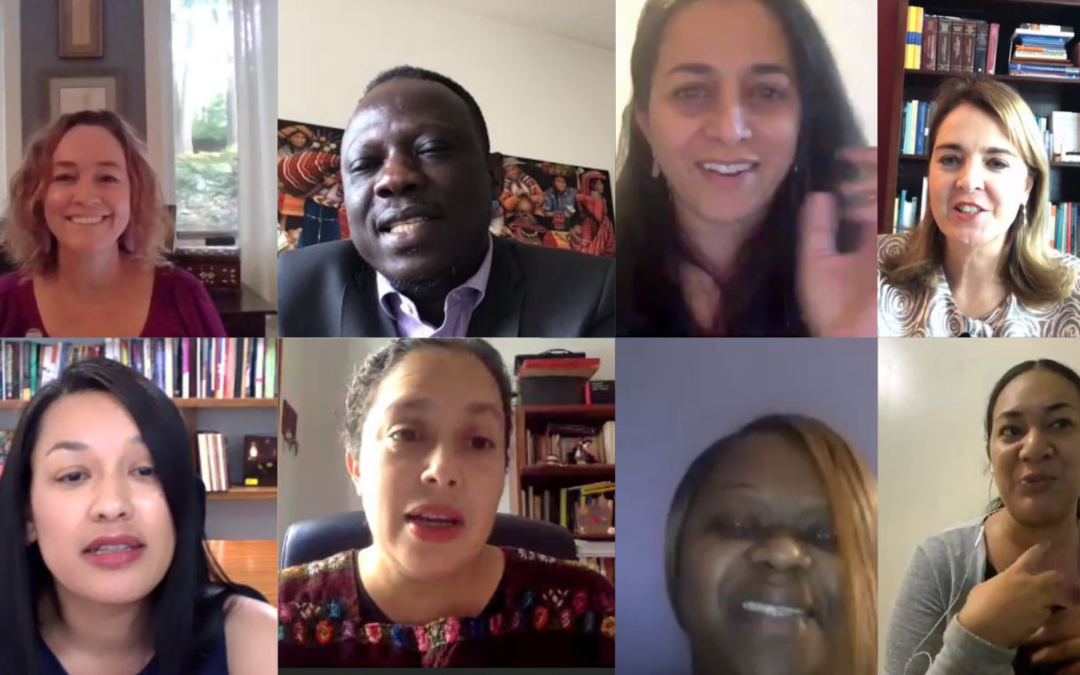
Oct 21, 2020
Even as gender equality and women’s fundamental rights are under attack around the world, women activists and their unions and organizations are standing up to the challenges and pushing back, panelists said yesterday during the launch of a landmark report, “Celebrating Women in Civil Society and Activism” with Clément Voule, United Nations Special Rapporteur on the rights to freedom of peaceful assembly and of association.
“Women around the world are building economic power by exercising freedom of association and assembly,” said Solidarity Center Executive Director Shawna Bader-Blau. “Unions and the right to collective bargaining is one way we fight back.” (Watch the event here.)
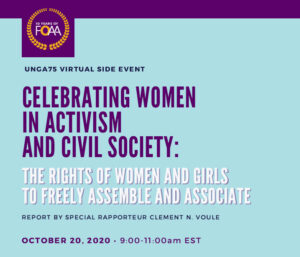 “Courageous women and organizations are pushing back,” said Bahia Tahzib-Lie, Netherlands Ambassador for Human Rights in her opening remarks. “They make clear that women’s voices can no longer be ignored or silenced.”
“Courageous women and organizations are pushing back,” said Bahia Tahzib-Lie, Netherlands Ambassador for Human Rights in her opening remarks. “They make clear that women’s voices can no longer be ignored or silenced.”
The virtual side event, co-sponsored by the Solidarity Center, brought together women civil society leaders from around the world to discuss the findings of the report, prepared by Voule, who is presenting the report to the UN General Assembly this week.
“Women’s organizations and movements and their contribution to activism and civil society continued to be undervalued,” Voule said, highlighting one of the report’s key findings. Their ability to freely form unions and associate is key to their ability to create positive change, according to the report. Yet these rights increasingly are being violated, he said.
“Women are 50 percent of the population” but are often targeted by harassment and other forms of violence when they seek to form unions to improve their workplaces, he said, one of the report’s many findings informed by the experiences of many Solidarity Center partners.
Gender-Based Violence Undermining Women’s Basic Rights

“All forms of gender-based violence and harassment must end,” says UN Special Rapporteur Clément Voule.
Crucially, the report finds that gender-based violence and harassment (GBVH) is “perhaps the fiercest form of reprisal to the exercise of the rights to freedom of peaceful assembly and of association for women workers.”
Gender-based violence begins at home for women and continues to all aspects of public space: “to the streets and the workplace and the public sphere,” said Voule, and COVID-19 lockdowns have worsened the violence women face at home.
The pandemic also has increased the violence women face at work, said Bader-Blau. But a new treaty the International Labor Organization approved last year creates the fundamental right to be free from violence and harassment at work by addressing the root causes of gender-based violence which often also involve race, ethnicity and gender identity.
The treaty, Convention 190, “demands employers and governments make real changes,” she said. “The treaty calls for employers to negotiate directly with workers. No longer can we look at workplace as the private sphere of the employer where workers give up their rights.”

Unions and the right to collective bargaining is one way we fight back”—Shawna Bader-Blau.
Unions and other activists are campaigning for their governments to ratify C190, a difficult process, but one that creates the opportunity for coalition building and cross-movement building among unions, feminist organizations and our allies, said Bader-Blau.
Voule also pointed out how the pandemic has been used to limit the space for civil society, with women especially targeted. “COVID-19 has increased criminalization of women’s rights organizations and harassment against women exercising their rights to peaceful assembly and association with worrisome reports on the misuse of emergency measures, application of criminal laws or limiting public gatherings.”
Progress, Challenges from Beijing +25
This year marks the 25th anniversary of the Fourth World Conference on Women and UN adoption of the Beijing Declaration and Platform for Action on advancing women’s rights, a landmark panelists said should be celebrated, but also reinforced and built upon.

World leaders are now talking about gender equality, but only due to the efforts of grassroots women activists, says Nicolette Naylor.
“Over the last 25 years, we have gone from zero laws, zero resolutions to over 120 laws and resolutions to protect gender equality,” said Nicolette Naylor at the Ford Foundation. “It shows us that progress is possible. This is thanks to women on the ground pushing for change. It’s because of the mobilization of women’s rights organizations and feminists on the ground.”
Making progress on ending gender inequality means involving women and ensuring their voices are heard, according to panelists who reinforced the report’s recommendations that “effective strategies to address violations of women’s rights to freedom of peaceful assembly and association should be grounded in supporting and empowering women’s movements and organizations in all their diversity.”
“Many women on the ground led the way. Now we need to create more space for women to get places they deserve so they can push forward these agendas,” said Mireille Tushiminina from the Cameroon Women’s Peace Movement. “To hold our governments accountable, we need to be part of the conversation. Women are at the forefront and need to be in the conversation.”
Uma Mishra-Newbery at the Women’s March Global moderated the panel, which also included Marusia López from the Mesoamerican Network of Women Human Rights Defenders and Masina Fusi at Her Voice.
Event co-sponsors included Access Now, CIVICUS, Freedom House, Geneva Academy, Iniciativa Mesoamericana de Mujeres Defensoras de Derechos Humanos, International Center for Not-for-Profit Law, Women’s Global March, Women’s Major Group and the World Movement for Democracy.
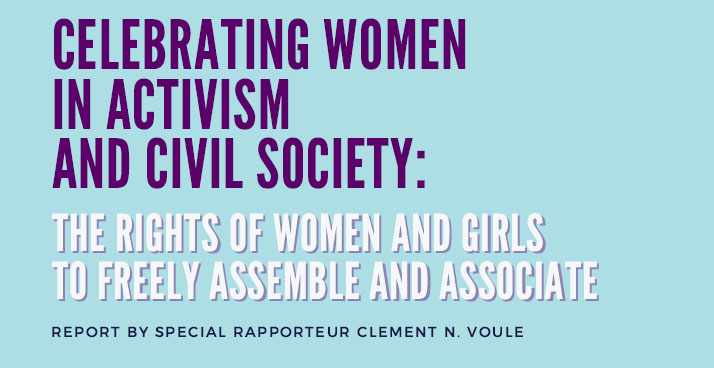
Oct 20, 2020
Women activists and their organizations are the drivers of positive change worldwide—and the freedom to form unions and freely associate is key to their ability to do so, according to a report released today.
“Celebrating Women in Civil Society and Activism,” prepared by Clément Voule, United Nations special rapporteur on the rights to freedom of peaceful assembly and of association, finds these fundamental freedoms empower women to “express their political opinions, engage in … economic and social activities … form and join trade unions and cooperatives, and elect leaders to represent their interests and hold them accountable.”
Yet women’s voices are undervalued, the report states, even as government, employers and others violate women’s rights, with many women experiencing an increase in severe violations of these fundamental freedoms and backlashes against gender equality. Exclusions from labor laws, barriers to forming and joining unions and reprisals for labor organizing leave women with “little leverage to change the conditions that entrench poverty, fuel inequality and limit democracy.”
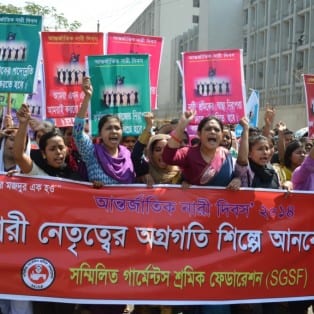
Women’s exclusion from labor laws and reprisals for forming unions in Bangladesh and around the world limit women’s ability to improve their workplaces. Credit: Solidarity Center
For instance in Bangladesh, “in many cases when garment workers want to unionize, they are blacklisted, intimidated, local groups threaten their families and many women are subject to physical assault,” says Nazma Akter, Awaj executive director and president of the Sommilito Garments Sramik Federation (SGSF). “There is no robust legal mechanism to appeal to for the right to organize and to help protect our human rights.”
Women seeking to improve their working conditions face similar challenges around the world, including in Ghana, where women “often are threatened with dismissals or non-renewal of contracts,” say Edward Kareweh, general secretary of the General Agricultural Workers’ Union (GAWU) and GAWU Gender Equality Officer Bashiratu Kamal. “There is a lack of cooperation from government in enforcing laws against discrimination, marginalization and exploitation.”
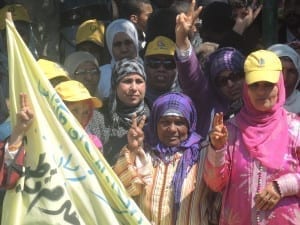
Agricultural workers in Morocco and around the world often are not covered by their countries’ labor laws, a lack of rights that falls especially hard on women. Credit: Solidarity Center/Hind Cherrouk
Laws barring retaliation against women who seek to form unions often are not enforced and additional barriers erected, say women activists.
In El Salvador, “the ability to form and join unions is a constitutional right, but in practice, there are many obstacles, ranging from delay in legal registration, defamatory campaigns, loss of employment, widespread violence, to murder in certain cases, says Marta Zaldaña, Secretary General of the union federation FEASIES.
“Tunisia’s Constitution guarantees equality and equal opportunities for men and women. But despite those important laws, the actual problem is in implementing those laws, especially in the interior regions where male domination prevails,” according to a Tunisian woman union activist.
Nazma, Kareweh, Kamal, Zaldaña and the Tunisian activist were among hundreds of worker rights and human rights activists whose testimony informed the report, which Voule is presenting this week to the UN General Assembly. SGSF, GAWU and FEASIES are Solidarity Center partners.
Gender-Based Violence the ‘Fiercest Form of Reprisal’
The ability of women to freely take action is especially critical now, as the COVID-19 pandemic has worsened the inequalities facing women, in their jobs, homes and communities.
“Faced with narrowing civic space, mounting inequalities and rising fundamentalisms, women have persisted in their fight for structural change, speaking truth to power and building resilience in their communities,” the report states.
Gender-based violence and harassment is “perhaps the fiercest form of reprisal to the exercise of the rights to freedom of peaceful assembly and of association for women workers,” the Special Rapporteur finds.
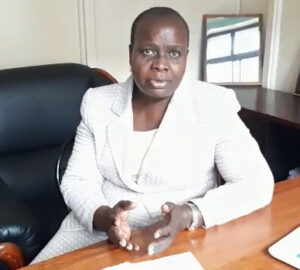
Violence is used as a way of discouraging women from actively participating in unions and seeking leadership positions—Rose Omamo, Metal Workers Union, Kenya. Credit: Solidarity Center
“Gender-based violence against women at work has been on the rise in various places in Kenya. Violence also is used as a way of discouraging women from actively participating in unions/associations and seeking leadership positions,” says Rose Omamo, general secretary of the Amalgamated Union of Kenya Metal Workers, a Solidarity Center partner.
And, when they protest gender-based violence and harassment, women then become targets. “Women workers in Nigeria have been involved in protests against all forms of gender-based, violence and harassment,” says Mercy Okezie, chairperson of the National Women Commission and Nigeria Labor Congress vice president.
“There have been protests against rape and abduction of young girls by terrorists, femicide, sexual harassment in markets and gender-based violence and harassment in the world of work. Some of the women who participated faced … gender-based violence attacks ranging from bullying, sex discrimination to loss of jobs, threats to life and social stigmatization as a result of speaking out or standing up to push for an end to GBVH at home, workplace, their unions and communities.”
Women Must Be Part of the Solution
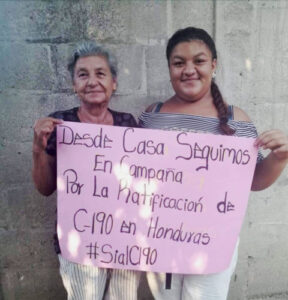
In Honduras, union activists are posting photos of themselves on social media with signs urging passage of C190. Credit: Promotoras Legales
In recommending steps to address violations of women’s rights to freedom of peaceful assembly and association, the report emphasizes the actions “should be grounded in supporting and empowering women’s movements and organizations in all their diversity.”
Governments must ensure adherence to international treaties addressing women’s right to a voice at work and in their communities, Voule said, speaking on a panel today with Solidarity Center Executive Director Shawna Bader-Blau and other civil society leaders. Among its recommendations, the report urges governments ratify International Labor Organization (ILO) Convention 190, which covers gender-based violence and harassment at work, and ILO C189 which recognizes domestic workers’ right at work.
Employers also “have a direct responsibility to respect and protect women’s rights to freedom of peaceful assembly and of association, to act with due diligence to prevent the violations of such rights and to provide women with effective remedies for violations connected to their operations,” the report states.
“Celebrating Women in Civil Society and Activism” builds on the 2016 UN Special Rapporteur report on workers rights that found workers rights—and the freedom to form unions and freely assemble—are key to achieving human rights because without assembly and association rights, workers have little leverage to change the conditions that entrench poverty, fuel inequality and limit democracy.

Oct 8, 2020
Delivery employees in Colombia who work for the online platform Rappi joined protests across Latin America today calling for decent wages, job safety and health protections for gig economy workers. Largely migrant workers from Venezuela, they provide essential services delivering food from restaurants and grocery stores to homes, including during the COVID-19 lockdowns.
The Rappi workers began to organize in response to fluctuating pay rates for individual delivery jobs, unexplained fines levied by the company, and the arbitrary barring of workers from the platform to accept jobs. Workers are seeking to unionize to address these issues and collectively defend their labor rights. Some 81 percent say their only source of income is by working for Rappi.
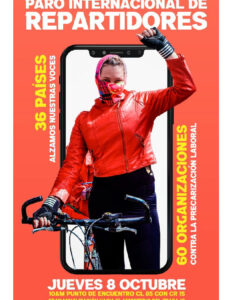 Riding motorcycles and bikes through Bogotá, Medellín, Pereira, Cali, Barranquilla, Bucaramanga and Cartagena, the workers culminated their protest at the offices of the Labor Ministry in each city, where they presented a petition to form a union, Union of Platform Workers (UNIDAPP), to secure their fundamental rights on the job.
Riding motorcycles and bikes through Bogotá, Medellín, Pereira, Cali, Barranquilla, Bucaramanga and Cartagena, the workers culminated their protest at the offices of the Labor Ministry in each city, where they presented a petition to form a union, Union of Platform Workers (UNIDAPP), to secure their fundamental rights on the job.
“These platforms derive their profits from the exploitation of hundreds of thousands of men and women around the world who work without rest or protection. for miserable income,” UNIDAPP said in a statement today. “We are workers without rights who go out to the streets day by day to meet the primary needs of this society.”
Even as workers at Rappi struggle to support themselves, Rappi last month raised more than $300 million in a new round of investment involving international funds, such as T. Rowe Price Associates. Rappi operates in nine countries in Latin America. On Mother’s Day in May, more than 4 million Colombians used the Rappi app, as delivery services benefited from increased demand due to social distancing and lockdown restrictions.
Of the 50,000 Rappi workers, almost none are covered by the nation’s safety and health laws, according to a 2019 study, which found that 63.2 percent had suffered work-related accidents and 67 percent contracted occupational diseases in the past two years. At least three workers at Rappi were killed on the job so far in 2020, two from traffic accidents and one during an attempted robbery.
Like gig workers around the world who struggle with low pay, dangerous working conditions and arbitrary treatment, Rappi employees seek passage of laws protecting their rights on the job and labor contracts to ensure those rights are enforced.
Although several bills are now in the Colombian Parliament to regulate digital platforms and require gig economy corporations to provide some basic workplace protections, UNIDAPP rejects the efforts because they were not drafted with worker input and fall far short of the basic protections they need.
The National Movement of Digital Platform Workers (MNRPD) is filing suit on behalf of the workers, seeking recognition of labor contracts that ensure labor rights. The SC collaborates with the MNRPD and provides technical and legal assistance to reinforce the union organizing effort.
UNIDAPP is an affiliate of the Central Workers’ Union (CUT), which heralded the new union, saying “we have a duty to fight for what we want, full workers’ rights, decent conditions of employment and social protection.”
“Today, a new stage begins for platform workers in the country,” UNIDAPP stated. “We are a strong trade union organization ready to bring our demands to all judicial, legal and administrative bodies, until we have labor rights!”




 “Courageous women and organizations are pushing back,” said Bahia Tahzib-Lie, Netherlands Ambassador for Human Rights in her opening remarks. “They make clear that women’s voices can no longer be ignored or silenced.”
“Courageous women and organizations are pushing back,” said Bahia Tahzib-Lie, Netherlands Ambassador for Human Rights in her opening remarks. “They make clear that women’s voices can no longer be ignored or silenced.”








 Riding motorcycles and bikes through Bogotá, Medellín, Pereira, Cali, Barranquilla, Bucaramanga and Cartagena, the workers culminated their protest at the offices of the Labor Ministry in each city, where they presented a petition to form a union, Union of Platform Workers (UNIDAPP), to secure their fundamental rights on the job.
Riding motorcycles and bikes through Bogotá, Medellín, Pereira, Cali, Barranquilla, Bucaramanga and Cartagena, the workers culminated their protest at the offices of the Labor Ministry in each city, where they presented a petition to form a union, Union of Platform Workers (UNIDAPP), to secure their fundamental rights on the job.